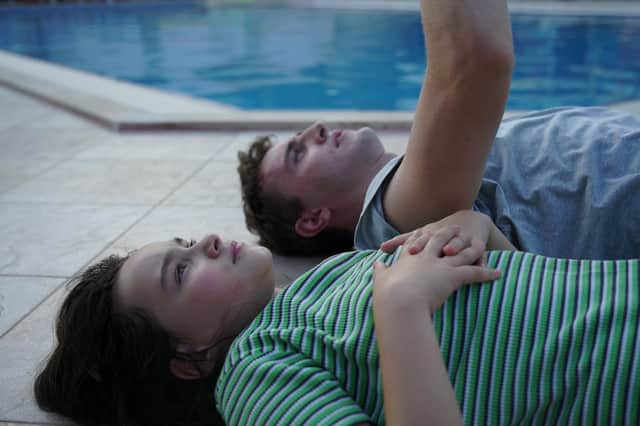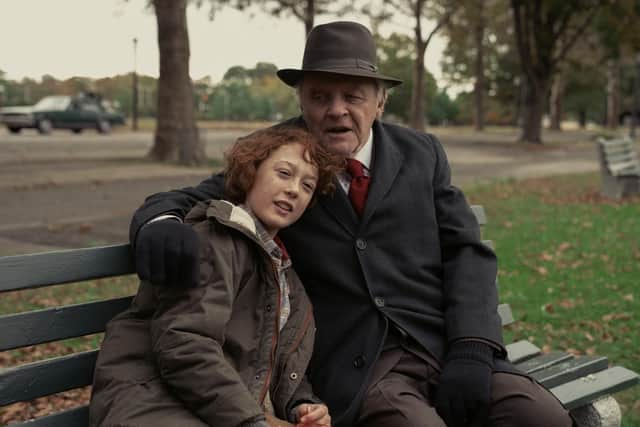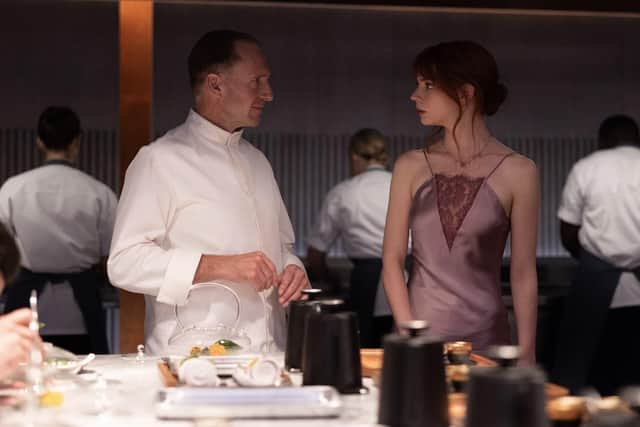Film reviews: Aftersun | Armageddon Time | The Menu | The Wonder


Aftersun (12A) *****
Armageddon Time (15) ****
The Menu (15) ***
The Wonder (15) ***
Edinburgh-raised/New York-based filmmaker Charlotte Wells delivers one of the best debuts in recent years with Aftersun. Revolving around a young Scottish father on a package holiday to Turkey with his daughter sometime in the late 1990s, it may come on like another artfully made, ominous-seeming coming-of-age film, but it gradually deepens into remarkable exploration of memory and family and that difficult moment where parents become real people in the eyes of their children.
When we’re first introduced to Calum (Paul Mescal) and Sophie (newcomer Frankie Corio) they have the sort of partners-in-crime bond of family members who like spending time with each other. Sophie is a sweet kid and Calum is a good dad; in the uniquely high-pressure environment of a foreign holiday resort where forced jollity is the order of the day, he’s the calm centre, never loosing his cool the way he sees other parents doing. In private, though, it’s a different story: Calum seems to be white-knuckling his way through something he instinctively wants to hide from Sophie.
Advertisement
Hide AdAll of which is subtly teased out. Mescal’s performance is delicate and restrained and his scenes with incredible newcomer Frankie Corio are shot through with genuine warmth and tenderness. But Mescal also infuses them with an underlying melancholy that intensifies in almost imperceptible ways, particularly as Wells toggles between Sophie’s in-the-moment view of Calum as her occasionally embarrassing dad and her shifting adult understanding of him as a complex human being. Wells pulls off this switch in perspective with astonishing verve, shooting the resort scenes in an unobtrusive style and intercutting these quietly joyous sequences with shaky holiday videos shot by Calum and Sophie on Calum's new-for-the-time digital video camera.


Gradually, though, flash-cuts to Sophie as a grown-up – suspended in the fractal glare of a strobe-lit nightclub – alter our understanding of what we’re watching. Sophie’s once-blissful memories of her dad are reframed as something rawer and her hitherto take-it-as-it-comes childhood innocence peels away like sun-blistered skin. On a purely technical level it’s a dazzling piece of filmmaking, but there comes a point – it involves David Bowie and Queen singing Under Pressure – where the two timelines appear to collapse and the emotional force of the film hits like a tsunami.
Aftersun would make a great double bill with Armageddon Time, Ad Astra director James Gray’s semi-autobiographical coming-of-age film about a working class Jewish kid negotiating a tricky adolescence against the backdrop of Ronald Reagan’s ascent to the presidency. Though America’s near-permanent lurch to the right remains in the background, it informs everything about its artistically inclined 12-year-old protagonist Paul Graff (Michael Banks Repeta), who gradually becomes acutely aware of the rigged nature of the American Dream as his nascent friendship with Johnny (Jaylin Webb), the only Black kid in his class, becomes a bone of contention for his parents (Anne Hathaway and Jeremy Strong) as they struggle to connect with their son.
Paul does have an ally in his beloved grandfather (Anthony Hopkins), but the film puts white privilege under the spotlight in a nuanced and uncomfortable way by showing the extent to which Paul lives in a world of second chances, a luxury not afforded Johnny. It’s a smart, sensitive, unvarnished film, one that sees danger in nostalgia and thus refuses to indulge in it.
Like the recent Triangle of Sadness, The Menu puts the super-rich on the chopping block in an island setting for a little eat-the-rich-style payback. Pitched as a sort of social horror movie version of Netflix’s high-end foodie show Chef’s Table (which inevitably gets a shout-out), the film stars Ralph Fiennes as Slowik, the obsessive chef and cult-like leader of a island restaurant whose wealthy clientele fork out $1,200 per reservation and dine on conceptually pretentious molecular gastronomic delights that flatter their egos without truly satisfying their stomachs.


Into this plausibly ridiculous world come a group of blithely monied patrons, among them a trio of arrogant tech bros, a washed-up movie star (John Leguizamo), a haughty food critic (the entertainingly awful Janet McTeer), and a Chef Slowik fan-boy (Nicholas Hoult), whose decision to bring an unannounced date (played by Anya Taylor-Joy) to replace the girlfriend who recently dumped him proves a major faux pas.
Advertisement
Hide AdIf this set up also brings to mind a classic Agatha Christie-style whodunnit, co-writers Seth Reiss and Will Tracy, and director Mark Mylod, are more interested in serving up a who-done-what, using each course of the meal to reveal something fundamentally despicable about each of the diners in preparation for just deserts that will soon be served up all round. It’s a bit of a shame, then, that the film undercooks the ending. A braver film would have gone the route of The Cook, The Thief, His Wife and Her Lover; this pulls a move straight out of Ratatouille.
Food also figures prominently in The Wonder, Sebastián Lelio’s intriguing if not always absorbing adaptation of Room author Emma Donoghue’s novel about an apparent miracle child’s ability to survive without food in the post-famine Ireland of the 1860s. Is the still-reeling community witnessing a candidate for sainthood or a fraud being perpetuated to cover up a darker crime? Florence Pugh takes the lead as an English nurse summoned to investigate, but Lelio’s decision to frame the film with an illusion-shattering opening shot of the film’s set (and a fourth-wall-breaking narration from a supporting character) ensures it’s really an investigation into the fictions people tell themselves to survive terrible times.
Aftersun, Armageddon Time and The Menu are in cinemas from 18 November; The Wonder streams on Netflix from 16 November